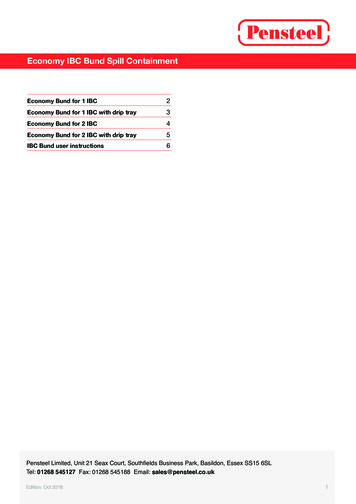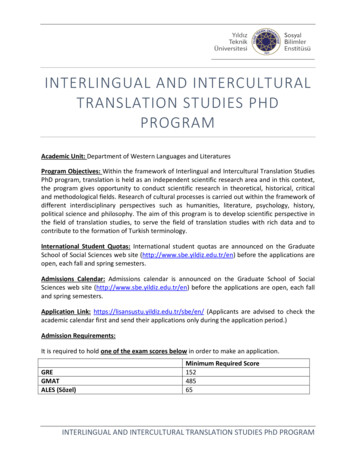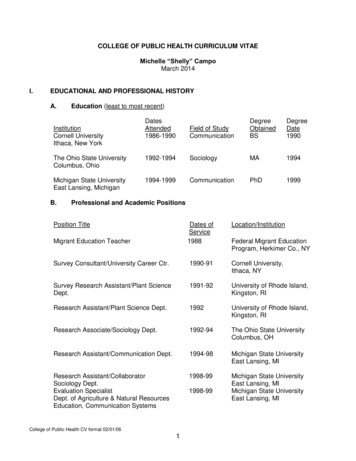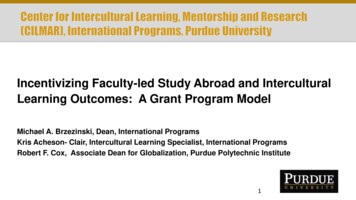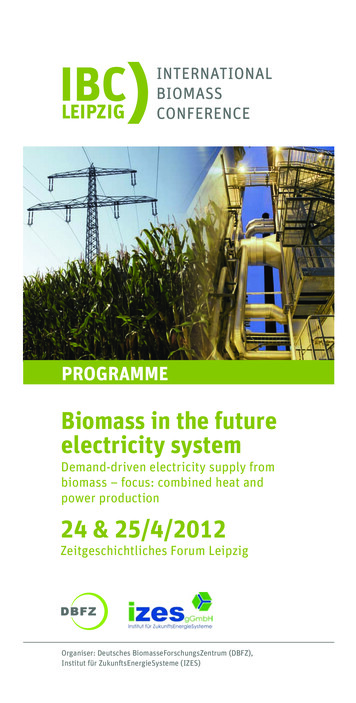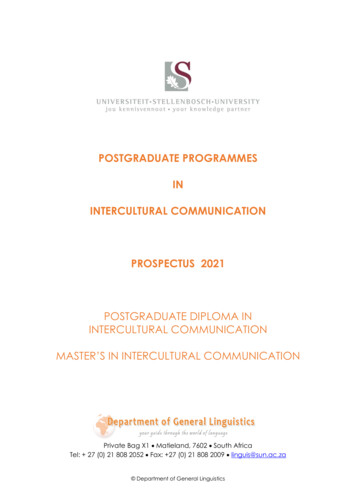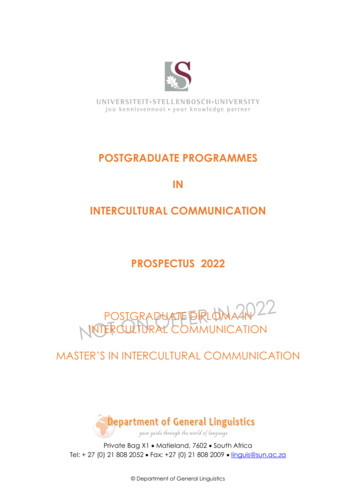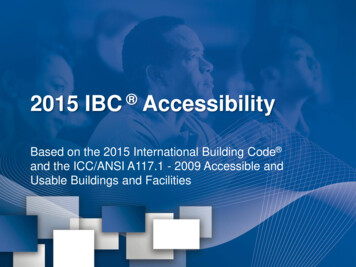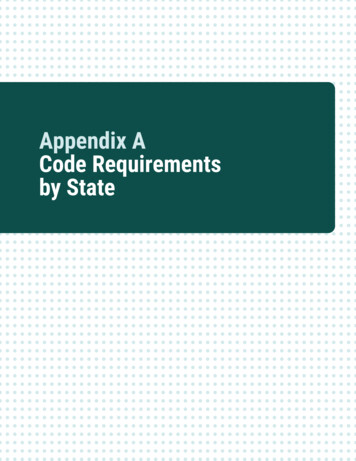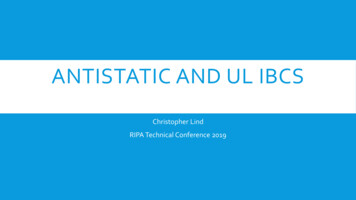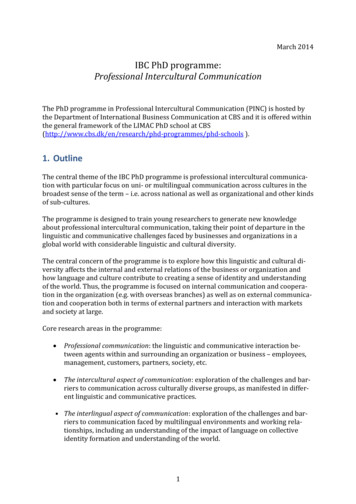
Transcription
March 2014IBC PhD programme:Professional Intercultural CommunicationThe PhD programme in Professional Intercultural Communication (PINC) is hosted bythe Department of International Business Communication at CBS and it is offered withinthe general framework of the LIMAC PhD school at hd-schools ).1. OutlineThe central theme of the IBC PhD programme is professional intercultural communication with particular focus on uni- or multilingual communication across cultures in thebroadest sense of the term – i.e. across national as well as organizational and other kindsof sub-cultures.The programme is designed to train young researchers to generate new knowledgeabout professional intercultural communication, taking their point of departure in thelinguistic and communicative challenges faced by businesses and organizations in aglobal world with considerable linguistic and cultural diversity.The central concern of the programme is to explore how this linguistic and cultural diversity affects the internal and external relations of the business or organization andhow language and culture contribute to creating a sense of identity and understandingof the world. Thus, the programme is focused on internal communication and cooperation in the organization (e.g. with overseas branches) as well as on external communication and cooperation both in terms of external partners and interaction with marketsand society at large.Core research areas in the programme: Professional communication: the linguistic and communicative interaction between agents within and surrounding an organization or business – employees,management, customers, partners, society, etc. The intercultural aspect of communication: exploration of the challenges and barriers to communication across culturally diverse groups, as manifested in different linguistic and communicative practices. The interlingual aspect of communication: exploration of the challenges and barriers to communication faced by multilingual environments and working relationships, including an understanding of the impact of language on collectiveidentity formation and understanding of the world.1
2. The need for researchers in professional intercultural communicationMore than ever, businesses and organizations need to act on an international scale, inthe context of the European Union as well as globally. New media and communicationtechnologies facilitate this international dimension at all organizational levels.Businesses employ overseas staff, have overseas branches, cooperate with foreign companies and sell their products or services in foreign markets. Similarly, organizationsand government authorities are involved in international cooperation and need to adaptto an increasingly transnational labour market. Globalization, however, has not diminished linguistic and cultural diversity; on the contrary, demands increase on the abilityof businesses and organizations to exploit the potential of this diversity, on one hand,and to overcome the barriers it invariably creates, on the other. Thus, for example, thebranding of the business and its products, as well as documentation and communicationwith external partners constantly need adaptation to changing linguistic and culturalconditions.Globalization also has consequences for internal communication and cooperation in thebusiness or organization. Language plays an important role in the creation of a sense ofidentity and belonging, and the linguistic identity of the individual employee must beacknowledged at the same time as the need for a common language for the whole groupof employees is accommodated.These challenges are already recognized but there is a growing need for knowledgeabout the options available for handling them in an organizational setting; furthermoreglobal dynamics and market developments constantly change the challenges and theircontexts. It is therefore vital to enhance the professional ability proactively to meetchanging conditions and expectations. In addition, since globalized, instant communication and the technologies enabling it are relatively recent phenomena, the problems andbarriers arising from them are only now becoming accessible as relevant empirical datafor description and analysis. Moreover, understanding what constitutes relevant linguistic and cultural competences and how to achieve such competences remain key concerns.This means that there is a demand for researchers with expertise in the linguistic andcultural challenges inherent in a world which may have become smaller but which isnevertheless characterized by distinctive linguistic and cultural differences. It alsomeans that there is a need for researchers who, on the basis of new empirical data, canproduce research results about the influence of linguistic and cultural diversity on theworking conditions of businesses and organizations - knowledge which is necessary inorder to ensure their operation and competitiveness in this globalized world.Examples of research areas within the PhD programme:1. Business narratives in an intercultural perspective2. Localization of product presentations and product documentation in an intercultural perspective3. Negotiation techniques in an intercultural setting4. Translation in an intercultural perspective2
5. Identifying and acquiring intercultural and interlingual competences6. Identity and language in an organization7. English as Business Lingua Franca8. Language policy9. Text genre and text structure across cultures10. Internal communication in a multilingual business11. The influence of the mother tongue on the use and perception of English12. Communication processes and their agents in an intercultural perspective13. Cognition, culture and language typology14. Communication technology and its role in communication across cultures andlanguages.3. Career opportunitiesPhDs graduating from the programme qualify for jobs in businesses and organizationswith an international profile, including public institutions such as ministries and authorities who cooperate with international partners. PhDs also qualify for teaching and research positions at universities and other institutions of further education.Examples of job functions:1. Management of internal and external communication in companies and organizations2. Development of language strategies and strategic language solutions in communications units3. Development of translation, language and communication strategies in translation companies4. Development of language and communication strategies and solutions in organizations and institutions5. Development of innovative language and communication solutions for intercultural marketing in export and marketing companies6. Development of language programmes in lifelong learning contexts7. Teaching and research at universities or in higher secondary education4. Learning objectives for the PhD programmeThe programme consists of three components: PhD project – The key element of the programme is an individual research project, carried out by the student under supervision and documented in a dissertation. The topic of the project is within the fields of communication, interculturalstudies and/or interlingual studies as outlined above. Usually the project takes itspoint of departure in a problem or challenge faced by a business or organization,and as a rule the key research questions and the relevant data are derived from abusiness or organization.3
Course work – The PhD student attends courses which support and enhance hisor her work on the research project. This includes a number of courses offered atCBS under this PhD programme as well as PhD courses offered elsewhere inDenmark and internationally. Unless the PhD student is subject to the rules governing industrial PhD students, he or she is also expected to spend at least threemonths at another, preferably foreign, university, where it will also be possible tofollow courses. Teaching and dissemination – Unless the PhD student is subject to the rulesgoverning industrial PhD students, he or she is required to teach a number ofcourses within the field of the research project. The student also carries out dissemination such as participation in conferences and workshops, presentations atcourses, appearances in the media (newspaper articles, radio programmes, etc).Workshops and courses can be organized in cooperation with businesses or organizations.A PhD student of this programme is capable of carrying out independent research withinthe area of professional intercultural communication. He or she is able to contribute tothe field with new knowledge about the challenges and barriers in a business or organization based on analysis of its linguistic and intercultural challenges and on thoroughknowledge of existing research and acknowledged methods. The PhD student is thusable to suggest research- based models for how businesses and organizations can mostprofitably handle such challenges and barriers. Such knowledge about intercultural factors and communication and about how to turn it into strategies for implementation is aprecondition for the optimization of business communication and action in interculturaland interlingual contexts.Through course work supporting his or her independent research, a PhD student gainstheoretical and practical insights into the following areas: Linguistic aspects of corporate life, including communication management, language policy and English as a lingua franca Intercultural issues and identity, including cultural awareness, interculturalcommunication and linguistic and culture-bound perceptions Quantitative and qualitative methods for studying communication and identityformation5. CompetencesUpon completion of the programme, the PhD has acquired the competences to: create new knowledge by generating and analysing data related to related to interlingual and intercultural challenges and barriers in businesses and organizationssuggest new models for interlingual and intercultural diversity and interaction inorganizational contextsdisseminate these insights to national and international audiences4
implement and manage policies and practices within and between organizationsrelated to interlingual and intercultural communication6. InfrastructureThe structure and organization of the PhD programme and the PhD school, LIMAC, encourage the student’s independent research and offer the student a supportive environment: Close contact to supervisor(s)Close contact to an active research environmentClose contact to other PhD studentsClose contact to the PhD coordinatorClose contact to businesses and organizationsThe programme aims for an empirical foundation in the research of the students, basedon data and problems gathered from businesses and organizations. Close contacts withbusinesses or other organizations are thus an important feature of all the projects in theprogramme.7. Course workThe programme presupposes student participation in courses which are relevant forand enhance the research project. Course participation constitutes 30 ECTS points of thefull three-year programme. As a rule, courses offered by the programme, within its particular thematic focus, make up 15 of the 30 ECTS points. The remaining 15 ECTS pointsare covered by courses chosen by the PhD student among other PhD courses availableacross CBS, nationally or internationally.The specialized courses offered by the IBC PhD programme cover such areas as:1. Intercultural cognition and intercultural competence: linguistic and social practices in different cultures, including the acquisition of this competence2. Linguistic identity in organizations3. Quantitative methods for studying communication in businesses and organizations, including methods for data analysis4. Qualitative methods for studying communication in businesses and organizations, for example discourse analysis, Conversation Analysis5. Language and culture management policy5
10. Internal communication in a multilingual business 11. The influence of the mother tongue on the use and perception of English 12. Communication processes and their agents in an intercultural perspective 13. Cognition, culture and language typology 14. Communication technology and its role in communication across cultures and languages. 3.
